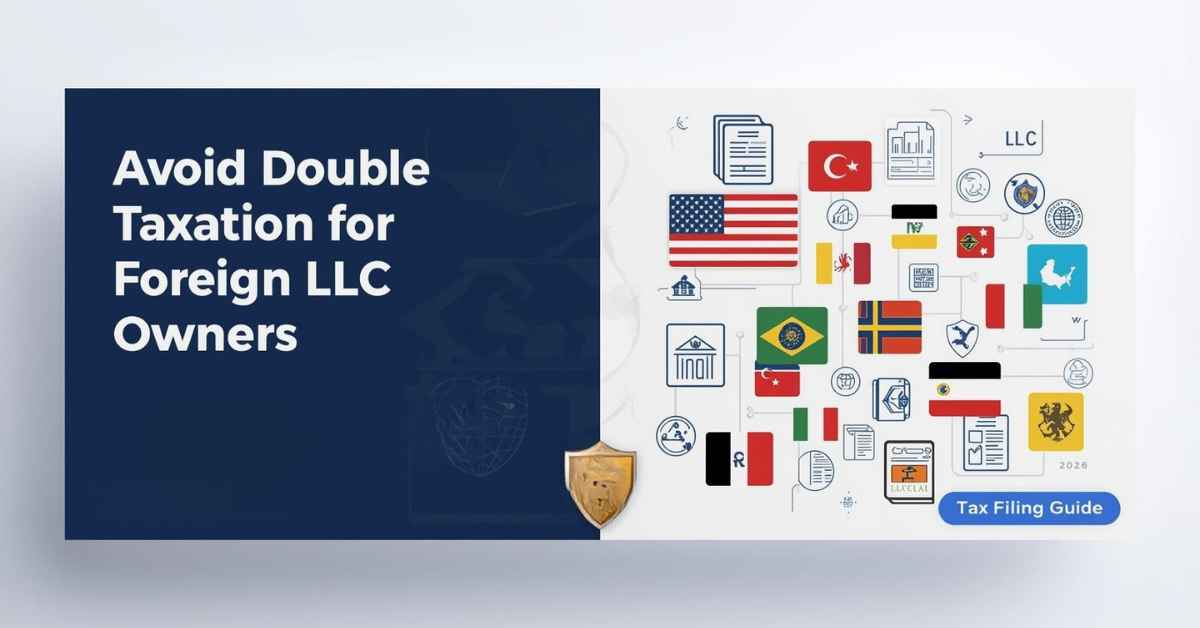Being an overseas entrepreneur operating a U.S. LLC could mean sleepless nights thinking about double taxation on the same income. The good news? If you have a proper understanding of how IRS rules and international tax treaties work, you may prevent double taxation for the foreign owners of an LLC with established approaches.
U.S. LLCs offer unique advantages through pass-through taxation, thereby naturally helping to avoid double taxation. This is a step-by-step guide on how foreign founders from India, Nepal, the UK, Canada, and other countries can legally minimize their tax burden while staying fully compliant.
What Double Taxation Means for Foreign-Owned LLCs
Double taxation refers to the fact that the same income is taxed in both the United States and your country of residence. This usually happens when income, for a foreign LLC owner, is first subject to U.S. taxes and afterward taxed again when reported in the country of residence.
This problem generally occurs with distributions from C-corporations, which are first taxed at the corporation level and again at the shareholder level. Since LLCs have pass-through taxation by default, they automatically avoid most instances of double taxation. However, foreign founders may still have withholding taxes and correctly classify their income.
How U.S. LLC Taxation Works for Foreign Founders
Pass-Through Taxation Explained
The beauty of LLC taxation lies in its pass-through structure. Unlike corporations, an LLC does not pay income tax at the entity level; instead, it passes profits on to members, who report them on their personal tax returns.
For foreign members, this income appears on Schedule K-1 from Form 1065. You then report this on Form 1040-NR, the tax return for non-resident aliens. It is structured this way to specifically avoid double taxation for foreign LLC owners.
A key concept is “effectively connected income” (ECI)—income that is duly connected with a U.S. trade or business. ECI is taxed at graduated rates rather than flat withholding rates and often provides superior treaty benefits.
When Do Withholding Taxes Apply
Despite pass-through advantages, foreign members of an LLC also face a withholding tax of 30 percent on certain U.S.-source income not effectively connected to a trade or business. Examples include passive income—such as interest and royalties.
Fortunately, tax treaties can dramatically reduce or even eliminate many of these withholding requirements. Determining which treaty provisions apply is critical in minimizing your tax burden.
U.S. Tax Treaties: How They Can Help Foreign Founders Avoid Double Taxation
Tax treaties are bilateral agreements exclusively intended to avoid taxing the same income twice. These treaties fix reduced withholding rates, allocate which country has primary taxing rights, permit foreign tax credits, and establish residency for tax purposes.
When used correctly, treaties offer the best legal framework to prevent double taxation for LLC owners abroad.
Tax Treaty Benefits for Founders from India
The India-U.S. tax treaty provides a considerable number of safeguards. It allows for reduced withholding rates and establishes a tax credit system to avoid double taxation. Where your LLC earns business profits, the treaty has specific rules regarding taxing authority based on permanent establishment criteria.
Members of an Indian LLC need to submit Form 1040-NR, but the treaty allows you to claim U.S. income tax credits when you file the Indian return.
Tax Treaty Benefits for Founders from Nepal
Presently, Nepal does not have an income tax treaty with the United States. This does not automatically signal double taxation, but careful planning is more important.
Without treaty protections, you would have to maximize the legitimate business deductions, get your LLC classification right, and correctly claim any foreign tax credits when filing your Nepali return. Documentation will become important in that you need clear records to support the foreign tax credit claims.
Tax Treaty Benefits for Founders from the UK
The UK-U.S. treaty is comprehensive, offering strong protections for British founders. It offers lower withholding rates and clear residency tie-breaker rules.
This treaty is of particular benefit to service providers and consultants, since it lays out when UK residents operating through U.S. LLCs need to pay U.S. tax versus when they can pay principally in the UK with appropriate credits.
Tax Treaty Benefits for Founders from Canada
The Canada-U.S. treaty prevents double taxation by allowing foreign tax credits. A Canadian resident will claim credits for any U.S. taxes paid, effectively eliminating double taxation.
The treaty includes “permanent establishment” rules that determine when the activities of an LLC by a Canadian founder will constitute sufficient presence in the U.S. to trigger U.S. income taxation. It also addresses the treatment, for Canadian tax purposes, of pass-through LLC income.
Key IRS Forms Foreign Founders Must File to Avoid Double Taxation
Form 1065 — LLC partnership return reporting all income and deductions prevents IRS misclassification.
Schedule K-1 — Reflects the allocated income share to each member. Assures appropriate attribution.
Form 1040-NR — Required for all foreign founders with U.S.-source income, even if no tax is owed. Failing to file will lead to penalties.
Form 8833 — Discloses treaty-based positions. To be used when claiming treaty benefits.
Form W-8BEN — Certifies foreign status and treaty eligibility, possibly allowing reduced withholding rates.
Form 5472 — Required for foreign-owned single-member LLCs. Failure to file has a minimum penalty of $25,000.
Common Mistakes That Lead to Double Taxation
The most common mistake is not claiming available treaty benefits. Failure to file Form W-8BEN results in improper 30% withholding. Founders might think they don’t owe tax in certain cases and thus do not file Form 1040-NR, but it is required.
Another critical mistake is not claiming foreign tax credits in one’s home country. Even if the U.S. taxes your income, your home country should grant a credit for those taxes, thus not leading to double taxation.
Other administrative issues, such as wrong EINs, missing ITINs, or incorrect LLC classification, also cause problems that result in double taxation.
Practical Tips to Legally Avoid Double Taxation as a Foreign LLC Owner
File all the IRS Forms Required on Time — Do not skip Form 1040-NR, even if you owe nothing. Proper filing establishes compliance and protects your right to claim credits.
Use Tax Treaties When Applicable — Research your country’s treaty with the U.S., and actively claim benefits with the Forms 8833 and W-8BEN.
Keep Clear Records — Document all U.S.-source income, expenses, and tax payments. These records are necessary for claiming foreign tax credits.
Avoid C-Corporation Structures — Whenever possible, the LLC form will automatically help avoid double taxation for foreign LLC owners.
Use Professional Filing Services — Cross-border tax issues can be very complex. Professional help ensures you get all available benefits and that you are filing correctly.
Track Residency and Permanent Establishment Rules — Knowing where you are considered a tax resident will guide your entire tax strategy.
Even in the absence of a treaty, expert tax filing can avoid double taxation by judicious use of deductions and foreign tax credits.
How EasyFiling Helps Foreign Founders Avoid Double Taxation
EasyFiling specializes in implementing strategies that allow foreign LLC owners to avoid double taxation for foreign LLC owners. Services provided include professional LLC tax returns for non-residents, correct treaty application, preparation of Forms 8833 and W-8BEN, application for ITIN, and full compliance with Forms 1065, K-1, and 1040-NR.
Avoid double taxation and keep your LLC IRS compliant — File your taxes with EasyFiling
FAQs About U.S. Tax Treaties & Double Taxation for LLC Owners
Does the U.S. have a tax treaty with my country?
The United States has tax treaties with more than 60 countries. To see the complete list and the treaty provisions, check the IRS website.
Do all foreign LLC owners have to file Form 1040-NR?
Yes, if you have U.S.-source income from an LLC, you must file Form 1040-NR regardless of tax owed.
Will I be double-taxed without a treaty?
Not necessarily. Although treaties provide a clearer route for avoiding double taxation for foreign LLC owners, you still can make use of foreign tax credits and deductions.
How do tax treaties affect LLC pass-through income?
Treaties often permit pass-through income to be taxed by business profits provisions, frequently with reduced withholding and clear rules about taxing authority.
File Your LLC Today
25$ off with a coupon
Lock in EasyFiling's transparent rates and get lifetime compliance support at no extra cost.
Get Started Now







